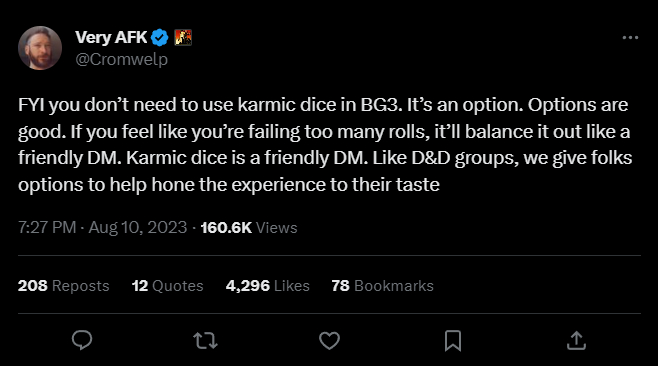If you're stuck in the middle of Baldur's Gate 3's karmic dice debate, Larian says you should think of it like 'a friendly DM'
The RPG's most divisive feature has been causing some confusion.

There's been a lot of chatter in the last few weeks about whether you should have Baldur's Gate 3's karmic dice option turned on or off. It's something that's turned on by default, intended to help level the playing field a bit and throw a few good rolls your way when things are looking very much bad and vice versa. Some players claimed that it was actively gimping their high-end gameplay though, with enemies receiving the same treatment with fudged dice rolls—dealing massive damage and causing survivability issues all round. Despite Larian saying it was an early access issue that would be fixed in the full release, there's still been tons of players going to bat for both sides of the argument.
With so much uncertainty around the feature, IGN noted that director of publishing Michael Douse has attempted to boil down the way they work in the best way possible. "It's an option," he tweeted. "Options are good. If you feel like you're failing too many rolls, it'll balance it out like a friendly DM. Like D&D groups, we give folks options to help hone the experience to their taste." In a follow-up tweet, Douse added: "The dice will always ensure you have a story to tell, but if you want the RNG gods to be slightly weighted in your favour, then karmic dice is for you."

It's a good way to look at it, though frustratingly it still doesn't really solve the issue of whether it's better to have the feature toggled on or off. The overall consensus seems to be that it's something which helps low-level or inexperienced players a lot more earlier on, but those with a better grasp on the inner workings of D&D may find it interrupts the flow of the gameplay in a noticeable manner. It's essentially the difference between true RNG—though I always question if computerised randomness can ever match the whims of a real-life dice roll—and RNG with the occasional fudged numbers to keep things interesting and not put less-skilled players (like myself) off for good.
I've personally been playing with karmic dice on and haven't noticed it being particularly brutal, though I'm a total D&D newbie so I hardly know what I'm doing in the first place. Staff writer Harvey Randall tells me he's been playing with the option turned off the whole time and it's been fine, while senior editor Robin Valentine says he's been experimenting with toggling the feature on and off and hasn't seen it make much of a difference. So I guess ultimately the decision is up to you—besides, aren't we all just save scumming the hell out of Baldur's Gate 3 anyway?
Keep up to date with the most important stories and the best deals, as picked by the PC Gamer team.

Mollie spent her early childhood deeply invested in games like Killer Instinct, Toontown and Audition Online, which continue to form the pillars of her personality today. She joined PC Gamer in 2020 as a news writer and now lends her expertise to write a wealth of features, guides and reviews with a dash of chaos. She can often be found causing mischief in Final Fantasy 14, using those experiences to write neat things about her favourite MMO. When she's not staring at her bunny girl she can be found sweating out rhythm games, pretending to be good at fighting games or spending far too much money at her local arcade.

